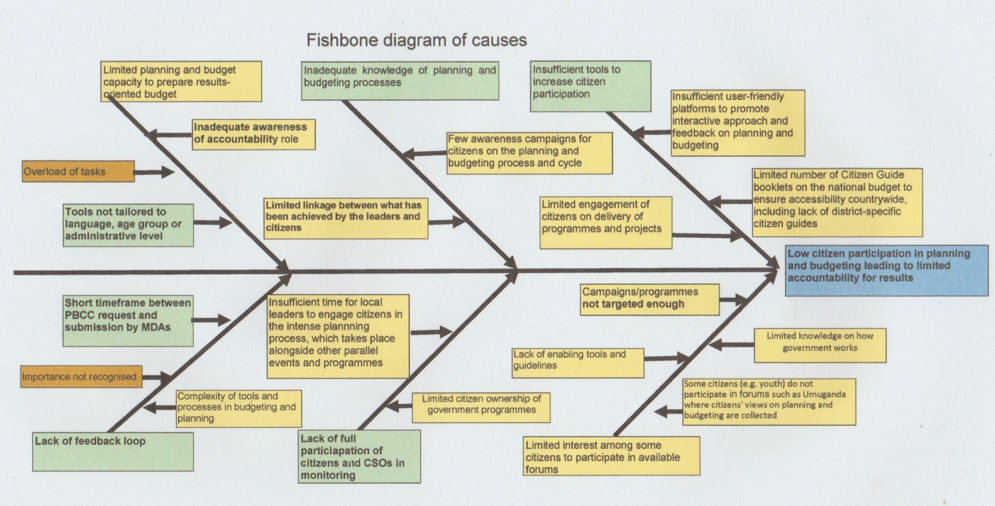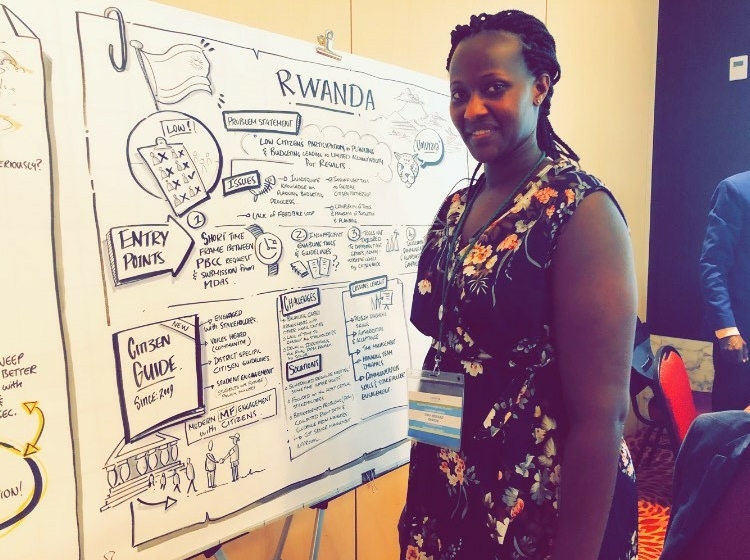Diana Mbabazi, Budget Management and Reporting Officer, Ministry of Finance and Economic Planning, Rwanda
Team Umurava is composed of six officials from the Rwandan Ministry of Finance and Economic Planning. As a team, we underwent the 8-month Building Public Finance Capabilities programme run by the Collaborative Africa Budget Reform Initiative (CABRI). The programme is anchored on the practice of the problem driven iterative adaptation (PDIA) approach geared towards building public finance capabilities. This is the story of our journey, which commenced with the process of identifying a problem. We were faced initially with the challenge of selecting a suitable and pressing enough public financial management (PFM) problem and discovered that the first two proposals made already had initiatives and legal instruments set up by the government to address them. In the end, the team elected to address the following concern: Low citizen participation in planning and budgeting leading to limited accountability for results.
Why this problem matters
It matters because without prior knowledge on both planning and budgeting, the citizens’ role of accountability for intended results is limited. Citizens are not aware of the available opportunities in the approved budget, such as new jobs to be created, possible tax cuts, tenders and so forth, since there is limited capacity to analyse budget documents. The government is required to make an additional effort after the planning and budgeting process to campaign for new policies that could have been communicated beforehand.
On selecting this problem, the team considered the results produced by the Citizen Report Card (CRC), an annual publication of the Rwanda Governance Board (RGB) geared towards ascertaining the levels of community satisfaction with regard to services rendered, but most especially with the purpose of providing public agencies and policy-makers with feedback from users on the quality and adequacy of public services delivered at the grassroots level. According to the CRC, the level of participation in planning and budgeting remains below the desired level despite some notable improvements (see Table 1).

Table 1: Citizen participation in district planning and budgeting
Figure 1, below, displays the complexity of our problem by mapping out its root causes. Beyond the identification of a problem, the PDIA approach requires the construction of a narrative around the problem (showcasing its magnitude and impact) and the deconstruction of the problem (to illuminate its underlying causes). In doing so, the team gained significant insights through group deliberations and through the engagement of the various stakeholders relevant to solving the identified problem. Listed below are some of the stakeholders we worked with on various activities.
1. UNICEF Rwanda
- The team has so far engaged UNICEF Rwanda to collaborate on improving citizen participation in both planning and budgeting.
- UNICEF Rwanda has agreed to finance the preparation, production and dissemination of more user-friendly citizen guide booklets for districts. Ten districts have been identified as pilots to date.
- In partnership with UNICEF Rwanda, MINECOFIN’s citizen guide to the national budget, will be disseminated in schools and universities for the first time. Three secondary schools and three universities have been identified for the first phase.
2. National Planning and Budget Departments (MINECOFIN)
- The national planning and budget departments have agreed to start providing public lectures in schools and universities in a bid to improve budget literacy as well as to provide a platform for the youth to get involved in national planning and budgeting.
3. CLADHO
- The team engaged CLADHO, a well-established human rights umbrella organisation in Rwanda, active in the area of human rights promotion, economic governance, the right to social protection, the right to education and citizen participation.
- CLADHO will be partnering with MINECOFIN to establish dialogues with citizens, especially during citizen guide distribution in order to emphasise the role and responsibilities of the citizen in national planning and budgeting.
4. LODA
- The Local Administrative Entities Development Agency, a government fund under the supervision of the Ministry of Local Government (MINALOC) focuses on local economic and community development, social protection, and capacity-building of local administrative entities within the scope of its mission.
- LODA was engaged to help citizens during planning and budgeting processes, especially in the selection of development projects to be implemented by districts as well as to provide a platform for feedback on the selection process from village level to district level.

Figure 1: Fishbone diagram
Process and progress
Through a process driven by small iterations and broad consultation, the team co-produced and implemented some meaningful actions. The team leveraged and bolstered existing platforms and tools and collaborated with relevant stakeholders to carry out different initiatives and to enrich our problem solving:
- Disseminating citizen guides (this has been done in the previous months)
- Engaging planners for all institutions on the First Planning Budget call circular
- Planning and budgeting call circulars (both central and local government circulars)
- Engaging students on the budget
- Holding citizen consultative meetings, including the use of ICT and social media platforms.
The progress towards the resolution of our problem has made the experience worthwhile, but what is perhaps even more powerful is the learning that we have acquired. One of the first lessons for the team is the need to construct a problem in a manner that is not already biased towards a preconceived solution. Unpacking the causes of a problem will lead to multiple solutions that often look very different from the initial assumptions made.
Another key takeaway for our group is the importance of a reflective process to help us look into failures, challenges and feedback as an opportunity to grow and build (or, when necessary, deconstruct). This methodology taught us to become better listeners, to arrive at a situation with an open mind instead of a will to impose external practices. These reflections and adaptations to the local context allow us to remain relevant both to the problem that we are trying to solve and towards our beneficiaries.
Our eight-month journey also reminded us of the importance of collaboration and co-ordination with a broad range of stakeholders. We understand now that recognising multiple perspectives, incentives and even interests is indeed useful in defining problems and formulating solutions. Sharing a common goal at the beginning of the work had founded a sense of belonging and motivation for all team members, even when times are hard, and the problem becomes more challenging.
In essence, the Building PFM Capabilities Programme has allowed us to appreciate the fact that capacity is developed through ‘doing’ and that it can be scaled up by sharing learning with colleagues within and even outside one’s organisation. Rather than hiring consultants or technical assistants to solve PFM problems in different countries, CABRI has diffused an approach that involves the support of local country teams. This promotes the ownership and sustainability of PFM reforms and brings to the fore the fact that one individual cannot be responsible for a change; change and reform happen through multi-agent efforts. Hence, the need to build effective teams of relevant individuals.
Furthermore, the PDIA approach has empowered the team not to shy away from trial and error. It has permitted us the ability to learn and iterate as many times as needed as we work towards addressing both technical and non-technical challenges.
This experience has given us a story to tell in our career progression, the story of six people in six different disciplines and varied expertise but working together to solve a problem – it has been an amazing team-building journey on which we have been able to pool ideas to solve a complex problem.
Despite the end of the Building PFM Capabilities programme, we are not stopping here. The team will continue to iterate until we arrive at fitting and sustainable solutions to our problem.
Also, we will continue to use the PDIA approach in our work and to improve our relationship with stakeholders and authorisers. We will continue the reflective process and the devising of workable action plans. We are grateful for this opportunity to learn, and for the exposure to a different a way of thinking about problems.

Diana Mbabazi, Budget Management and Reporting Officer, Ministry of Finance and Economic Planning, Rwanda
Moving forward, the team will focus its efforts on the following:
- Enhancing current tools and developing new ones
- Scale up district-specific citizen budget guides where we need to increase the districts from 10 piloted ones to all districts. Develop a more concise and user-friendly guide for FY 2020/2021.
- Simplify the citizen guide.
- Work with LODA and MINALOC to finalise the full operation of the participatory planning tool in MIS with regard to harmonising current tools for citizen engagement.
- Engage with partners to develop and scale-up innovative tools for awareness- raising, including further simplification of citizen guides and the preparation of flyers.
- Assign a member of staff the role of addressing the correspondence from the open budget portal identifying positive deviations through CRC and propose to replicate them.
- Advocate for the addition of the feedback menu on the open budget portal that is currently under tender process.
- Broadening outreach
- Disseminate the citizen guide and conduct a public lecture at the three universities identified
- Conduct awareness campaigns on the budget in more secondary schools and universities (which has been done)
- Increase the number of schools and universities for awareness campaigns in 2020/21
- Develop media engagements
- Hold sensitisation campaigns with district executives to disseminate the booklets and explain to citizens the role they should play in the process.
- Building capacity
- Conduct training on the PDIA approach for MINECOFIN and other partners
- Conduct training on the budget process for all district executive secretaries.